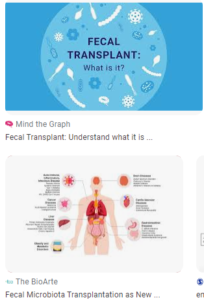News . Best Practices Students engaged with families and communities through newsletter and twitter

This best practice reports an open schooling initiative about Poo Transplants developed by The Compton School in London. Participants were 45 GCSE students (age 14-16). Their science action mission was to advise an obese friend whether having a faecal transplant will help them to lose weight. Their families were involved and asked to find out about the role of gut bacteria in health by playing a fun game based on the card game happy families. They also used an online quiz to find out how healthy their gut is. Scientists role was to talk about their research into the role of the gut microbiome on physical and mental health.
CARE: Students were not aware faecal transplant existed. This attracted their curiosity and interest with need to know more about the topic to make decisions. Students were engaged with families and communities through newsletter and twitter
KNOW: This also developed their knowledge from GCSE Biology Organisation – Digestion Topic. The curriculum link was the role of bacteria in the digestive system. It also was designed to teach students how to be critical about the results from scientific studies.
All students were asked to review the reliability of sources and present a 5 min oral presentation on what they found out.
DO: Students worked together in groups of 3 to create a 5 min oral presentation giving their friend advise, with reasons for their opinion.
Findings: It fits in very well with AQA Biology Topic 2 Organisation – Digestion.
Outcomes: No problems apart from students’ confidence in presenting to the whole class.
Some suggestions for teachers are to give students information on how to plan a presentation, give them a template to complete.
Fifty students contributed to the open schooling research questionnaires. Most of them mentioned that they would like to do more activities like this one. Most students practiced various skills including discussions and research. They liked to work in groups with friends, practical activities and doing research.
More details of our report: on this link.